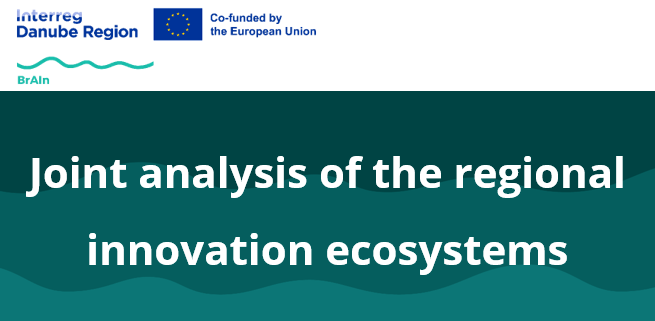Key Takeaways from "Joint Analysis of Regional Innovation Ecosystems’’ preformed under the BrAIn project, supported by the Danube Interreg program.
12/06/2024
The "Joint Analysis of Regional Innovation Ecosystems" report, conducted under the BrAIn project and supported by the Danube Interreg program, provides an in-depth examination of the factors shaping AI adoption among SMEs across 10 regions in Europe.
This comprehensive study analyzes regional innovation ecosystems, focusing on the skills required for SMEs to integrate AI-driven processes. It highlights the strengths and challenges faced by different regions, from advanced areas like Baden-Württemberg and Upper Austria, which benefit from strong R&D and government support, to emerging regions such as Bulgaria, Romania, and Moldova, which face obstacles like limited capital access and skill gaps.
The analysis delves into political, economic, social, technological, legal, and environmental factors, offering key insights into how tailored strategies, increased funding, and enhanced collaboration between academia and industry can drive digital transformation. It also outlines actionable recommendations for SMEs to adopt AI technologies, improve competitiveness, and foster innovation through regional and cross-border partnerships.
Ultimately, the findings stress the importance of supporting AI adoption with appropriate infrastructure, funding mechanisms, and educational reforms to bridge regional disparities and accelerate AI-driven growth in Europe.
Here are some of the key takeaways from the "Joint Analysis of Regional Innovation Ecosystems":
- Executive Summary
- The report focuses on understanding the skills needed for SMEs to adopt AI-driven processes, analyzing regional innovation ecosystems across 10 BrAIn project partner regions.
- Key findings:
- Advanced regions (e.g., Baden-Württemberg, Upper Austria) lead in AI adoption through robust R&D and government support.
- Emerging regions (e.g., Bulgaria, Romania, Moldova) show potential but face challenges like capital access and skill gaps.
- Recommendations include increasing funding, fostering academia-industry collaboration, and streamlining regulations.
- Political Factors
- Strong policy frameworks in Baden-Württemberg and Upper Austria support innovation and AI adoption.
- Centralized governance in countries like Bulgaria enables streamlined strategies but may overlook regional needs.
- Key EU programs like Horizon Europe significantly aid digital transformation and AI adoption.
- Economic Factors
- Advanced economies (e.g., Baden-Württemberg, Upper Austria) leverage industrial strengths and export capacities.
- Regions like Hungary and Slovakia focus on integrating advanced technologies in manufacturing and agriculture.
- Funding availability and venture capital ecosystems play a pivotal role, with EU funds providing critical support across the regions.
- Social Factors
- Education systems vary, with Baden-Württemberg excelling in dual vocational training and digital literacy.
- Moldova and Serbia face challenges in workforce readiness and digital skill integration.
- Regions emphasize lifelong learning and STEM education to align with industry needs.
- Technological, Legal, and Environmental Factors
- Baden-Württemberg and Upper Austria have advanced digital and R&D infrastructures.
- Emerging regions face barriers like regulatory complexity and limited digital frameworks.
- Investments in AI infrastructure and cross-sectoral hubs are essential for scaling AI adoption.
- AI Applications in SMEs
- Priority sectors include manufacturing, agro-food, and healthcare.
- Recommendations for SMEs:
- Leverage EU resources and targeted funding programs.
- Build digital skills through training and collaboration with academia.
- Adopt AI technologies for process optimization and competitiveness.
- Regional Collaboration and Innovation
- Regional hubs like Slovenia's Digital Innovation Hubs foster knowledge sharing and innovation.
- Cross-border partnerships enhance AI integration and digital transformation.
- International programs (e.g., Horizon Europe) are instrumental for fostering collaborative innovation.
This comprehensive analysis highlights the critical role of tailored strategies, funding mechanisms, and education reforms in advancing AI-driven innovation among SMEs across diverse regional ecosystems.